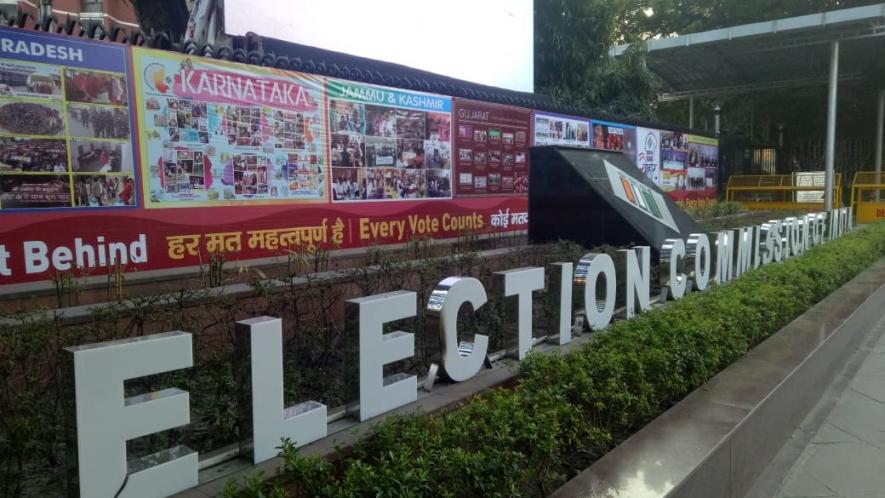Election Commission's Patchy Response to Code of Conduct Violations

Image Courtesy : Rafat Alam
The Election Commission of India (ECI) has its hands full with the seven-phase Lok Sabha election this year. The tenor of the elections and the campaigns have reached a fever pitch with differing narratives. The ruling Bharatiya Janata Party (BJP) has pushed for muscular nationalism in the face of unfulfilled promises from its 2014 manifesto, hence the use of the phrase “Modiji ki sena (Modi’s army)” for the armed forces of the country. Those opposed to the BJP have been pointing to the numerous lynchings that have been targeted at Dalits and Muslims. However, the ECI seems to be busy issuing directives to sensitise the campaigning politicians to desist from such remarks. The other tool seems to be timebound suspensions from rallies for particularly sensitive statements, as in the cases of Mayawati and Yogi Adityanath. Other directions issued by the Commission seem almost weak-kneed, such as allowing Pragya Thakur to contest and not taking NaMo TV off the air.
Also Read | The NaMo TV Mystery
Creative Advertising
The Commission has been able to step in and bar the screening of four biopics, one of which is a web series on Narendra Modi. In an Order dated April 10, the Commission expressly barred the screening of the films PM Narendra Modi, NTR Laxmi and Udyama Simham. While the likely content of the first film is clear for most people from the name, the other films are biopics of Late NT Rama Rao and K Chandrashekar Rao respectively. Additionally, in an Order on April 20, the ECI barred Eros Now from streaming its web series Modi: Journey of a Common Man.
However, on April 15, in response to the makers of the Narendra Modi biopic, the Supreme court instructed the ECI to watch the film and then report to the Court in a sealed cover whether it can be screened during election time.
In its April 10 Order, the Commission admitted:
“As these contents are incorporated in the story line/scheme of the programs being shown and there would be difficulty in proving the payment of money, they may not fall under the category of “advertisement” strictly and may remain outside the purview of MCMC (Media Certification & Monitoring Committee) certification requirement, thereby evading the directive given by the Hon’ble Supreme Court in Secretary, Ministry of Information and Broadcasting vs. M/s Gemini TV [(2004) 5 SCC 714].”
Also See | Modi vs Vivek Oberoi: Who's the Better Actor? Bharat ek Mauj, S3E2
It is indeed interesting that the ECI referred to the Gemini TV case. Particularly since the case has a direct bearing on the NaMo TV issue. In this case, Rule 7(3) of the Cable Television Networks Rules, 1994 was challenged in the Andhra Pradesh High Court. The Rule prohibits advertisements of religious or political nature on television channels. In March 2004, the High Court passed an interim Order staying the operation of Rule 7(3). The Ministry of Information and Broadcasting filed challenged the interim Order in the Supreme Court. The Supreme Court then passed an Order directing any persons intending to issue political advertisements to submit an application with the ECI, and only after obtaining the necessary permission can the content be displayed.
Also Read | EC Okays Live Speeches of PM on NaMo TV in ‘Silence Period’
Considering that the Supreme Court in the 1995 case of Secretary, Ministry of Broadcasting and Technology v. Cricket Association of Bengal held that airwaves are public property, NaMo TV could amount to political advertising on public property. The ECI issued a directive to the Chief Electoral Officer (CEO) of Delhi on April 11 stating that “all political advertisements and all recorded programmes with political contents are mandatorily required to be pre-certified by the MCMC before telecasting/displaying.” The Commission also stated that “any political publicity materials/contents, being displayed on electronic media without the requisite certification from competent authority (MCMC in this case) should be removed immediately and any political content shall only be permitted strictly in accordance with the ECI instructions in this regard.”
NaMo TV appeared on March 31, however, the channel’s launch was known at least two days in advance. Yet, the ECI only took action on April 11, the day of the first phase of polling. The tricky aspect of this particular situation is that the channel’s name may also be construed as political advertising. Besides, when the ECI enquired from the Ministry of Information and Broadcasting about the channel, the response was that the channel was an advertising platform and did not require a license to operate. However, Clause 3 of Rule 7 of the Cable Television Networks Rules, 1994, states that; “No advertisement shall be permitted, the objects whereof are wholly or mainly of a religious or political nature; advertisements must not be directed towards any religious or political end.” The ECI has failed to have NaMo TV taken off the air, and instead has allowed live speeches to be displayed. Thus, only the pre-recorded content has to pass the MCMC.
Also Read | Elections 2019: Attack on Dalits and A Silent BJP’s Loud Speeches on Martyrs in North Karnataka
Hate Speech
The ECI’s track record on combating hate speech in the course of campaigning seems to be quite patchy. After being prodded by the Supreme Court, the Commission did impose a ‘time-out’ on Mayawati, Azam Khan, Yogi Adityanath and Maneka Gandhi for violating the MCC through their speeches. However, the Commission seems to have refused to touch Narendra Modi and Amit Shah. A report in The Print on March 12 – two days after the MCC came into force – has alleged that Narendra Modi abused his office as the prime minister to get the Intelligence Bureau (IB) to prepare reports on the mood of the voters following BJP’s losses in Madhya Pradesh, Jharkhand and Chhattisgarh in December last year. The least the Commission could do to appear impartial would have been to issue a notice.
Similarly, Scroll.in reported on April 10 that the NITI Aayog has been used by the Prime Minister’s Office to request local area knowledge ahead of Narendra Modi’s campaign visits. According to Scroll.in, the collector of Gondia district, Kadambari Balkawad, sent a note to the NITI Aayog with such information which included a brief history of Gondia and demographic profile among other information. Incidentally, Narendra Modi held a rally at Gondia on April 3.
On the first day of polling, Amit Shah at a rally in West Bengal mentioned that the BJP will pick up the ‘infiltrators’ and throw them into the Bay of Bengal. The reasonable presumption with such a statement would be that he is referring to the alleged undocumented immigrants from Bangladesh. However, considering the BJP’s twin promises of an all India National Register of Citizens (NRC) and the passage of the Citizenship Amendment Bill, the statement can only be construed as meaning Muslims will be the ones to face such a fate. Hence, the communal underpinning is unmissable. The ECI once again in this instance seems to have declined issuing a notice.
The matter of hate speech in political campaigns found its way into the Supreme Court through a public interest litigation on April 8. On April 15, the ECI told the Court that their powers are very limited, they can only issue notice and advisories but cannot take concrete action. This contention was dismissed by the counsel for the petitioner who informed the Court that the ECI under Article 324 has extensive powers. Considering that the ECI is a body established by the Constitution, it would appear that this was done to ensure its independence. Perhaps, as a result of the Courtroom exchange, the ECI then issued Orders for time-bound suspensions on the campaigns of Mayawati, Azam Khan, Yogi Adityanath and Maneka Gandhi. Yet, CVigil does not seem to have recorded any complaints against either Narendra Modi or Amit Shah.
Also Read | Stop Use of Armed Forces For Political Agendas: Veterans Write To President, ECI
Armed Forces
The ECI had issued an advisory to all political parties on March 9 saying that they should desist from displaying the photographs of defence personnel or using defence operations as a part of their political campaigns. The same was reiterated on March 19. Yet on March 23, the Gujarat unit of the Congress submitted a complaint to the ECI that the BJP had been distributing pamphlets with the mention of Balakot air strike and the surgical strike as a part of their campaign. According to CVigil, the matter has been decided and an order has been passed in Gujarati.
Veterans of the defence forces wrote to the President and the ECI to advise all political parties to desist from using the defence forces as a part of their election campaign. The letter was made public on April 11. That veterans wrote such a letter just ahead of polling would lead one to presume that the ECI’s advisories were not exactly heeded. Further, the ECI seems to be tying its own hands despite sufficient powers being provided to them by the Constitution.
Crime and Punishment
The cases of Hardik Patel and Pragya Singh Thakur make for an interesting comparison. The ECI in handling the two cases has strictly adhered to the letter of the law. Section 8 of the Representation of the People Act, 1951 provides for disqualification on conviction for certain offences. Hence, since Hardik Patel was convicted with a sentence of three years in a 2015 rioting case, he was barred from contesting the elections as clause 3 of the section makes it clear that a conviction of two years or more for an offence other than those mentioned in the section will be a ground for disqualification.
Pragya Singh Thakur, on the other hand, has not been convicted in the 2008 Malegaon blasts case yet. That the case is progressing at a snail’s pace is another matter. The Representation of the People Act does not have a provision for disqualifying an undertrial even if they are out on bail. The crime for which she had been arrested is of a serious nature. However, seeking to bar a person from contesting when the case has not been concluded can become a double-edged sword. A vindictive government could then in theory have opposition leaders implicated in weak cases and have them arrested before an election only for the trial court to dismiss the cases after the election has been concluded. Therefore, the ECI sticking to the letter of the law in this case may in fact be a blessing in disguise.
Also Read | Sadhvi Pragya Granted Bail on ‘Health Grounds’, But Fit to Fight Elections?
Get the latest reports & analysis with people's perspective on Protests, movements & deep analytical videos, discussions of the current affairs in your Telegram app. Subscribe to NewsClick's Telegram channel & get Real-Time updates on stories, as they get published on our website.
























